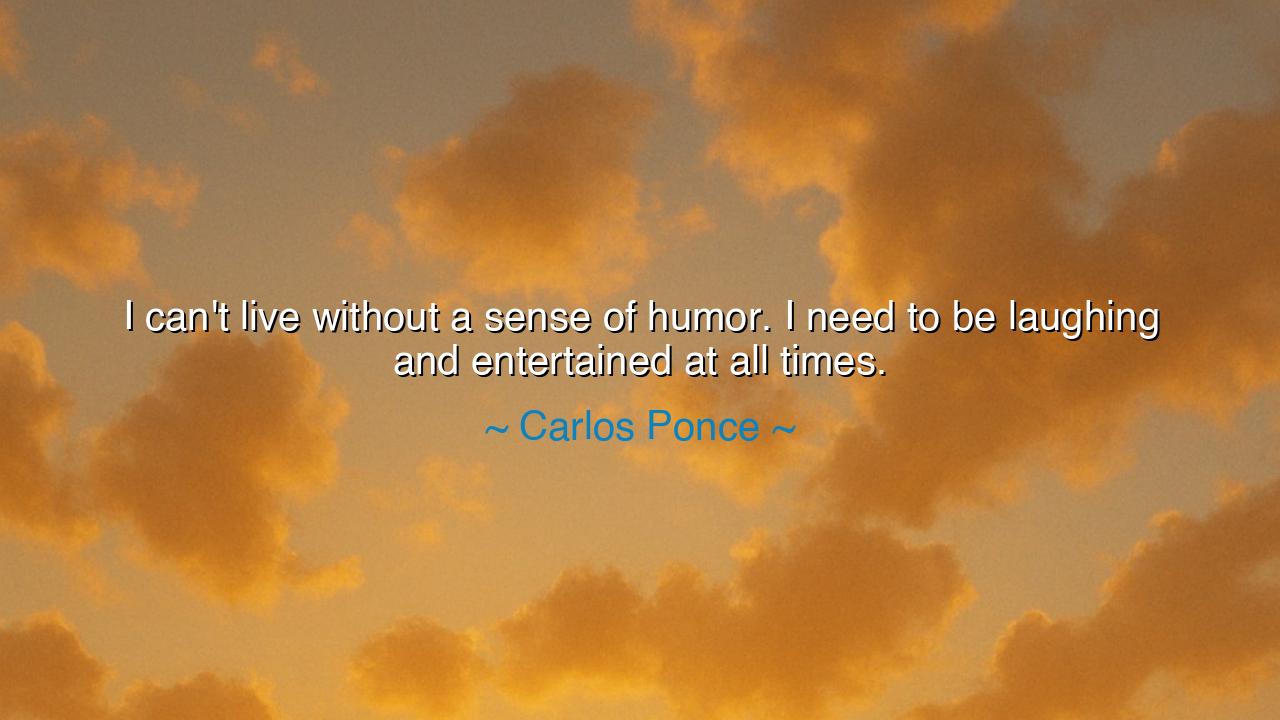
I can't live without a sense of humor. I need to be laughing and
I can't live without a sense of humor. I need to be laughing and entertained at all times.






When Carlos Ponce declared, “I can’t live without a sense of humor. I need to be laughing and entertained at all times,” he was not merely confessing a preference for comedy, but revealing a philosophy of life—a way of surviving the world’s chaos through joy. His words carry a lightness that hides deep wisdom: that laughter is not an escape from life, but a way of enduring it. The man who laughs does not deny his struggles; he transforms them. Ponce’s declaration is the voice of one who understands that without humor, the spirit becomes brittle and the heart grows dim. For humor is not a luxury—it is the breath of resilience, the divine spark that keeps despair at bay.
The origin of this sentiment lies in Ponce’s own journey as an artist, actor, and musician. Born in Puerto Rico, he rose to fame not merely through talent, but through warmth, wit, and charisma. Life in the public eye can be harsh; fame invites both praise and scrutiny, triumph and loneliness. Yet Ponce found strength in laughter. In the worlds of theater and music, where emotion runs high and rejection is frequent, he learned that humor was the shield of the soul. His laughter became a language of hope, a reminder that joy, when chosen deliberately, is the most defiant form of courage. When he said he “needed to be laughing and entertained,” he was not seeking distraction, but balance—the laughter that clears the clouds from a weary heart.
To live with humor is to live with light, even in the valley of shadows. The ancients knew this well. They spoke of the “divine fool,” the one who could laugh at kings, at fate, and even at death itself. In every culture, the jester, the comic, and the poet held sacred roles. They were not merely entertainers; they were healers. For laughter binds the broken pieces of the human spirit and restores perspective when fear or pride blinds the mind. The man who can laugh at his own sorrow is free, for he has robbed the darkness of its power. Thus, Ponce’s words echo an ancient truth: that humor is the armor of the heart, forged in the fires of pain yet shining with the light of peace.
Consider the story of Charlie Chaplin, who, like Ponce, made laughter his life’s work. Born in poverty, raised in hardship, Chaplin’s childhood was one of hunger and loss. Yet he became one of the greatest comedians the world has ever known. His films made millions laugh, even during times of war and despair. But Chaplin himself once said, “To truly laugh, you must be able to take your pain and play with it.” In that playfulness, we find what Ponce’s words mean at their deepest level—that laughter is not the denial of sorrow, but its transformation into wisdom. The man who laughs at life’s absurdities conquers them, for he refuses to be their victim.
Yet, let us not mistake humor for triviality. To live with laughter is not to live without depth, but to see depth differently. The stoic philosopher Epictetus taught that it is not events themselves that trouble us, but how we perceive them. Humor, then, is perception made free—it is wisdom’s smile. It does not erase pain, but places it within the grander comedy of existence. For in laughter, we admit our smallness, and in that humility, we discover grace. The proud man cannot laugh, for he clings too tightly to the illusion of control. But the wise man laughs easily, for he knows that life, like art, is both tragic and absurd, and that joy is found not in mastery, but in acceptance.
In times of hardship, those who forget to laugh forget how to live. The world will always demand your seriousness, your worry, your fear. But the soul, like a child, hungers for play. Laughter restores the rhythm of being; it reconnects us with the sacred pulse of life. Carlos Ponce’s need to “be laughing and entertained” is not a weakness—it is a form of reverence. For to find delight even in the mundane is to worship the beauty of existence itself. The one who laughs often is close to the gods, for he celebrates what is, rather than lamenting what is not.
So, let this be the lesson for all who hear these words: seek humor as you seek air. Laugh when you can, especially when you least want to. Find the jest hidden in every trial, and let it teach you to see the world anew. Surround yourself with those who make your spirit light, who remind you that joy is not naïve but necessary. Let laughter be your companion in sorrow and your guide in confusion. For the heart that laughs freely is unbreakable, and the life that finds entertainment in each day is never truly defeated.
Thus, remember the wisdom of Carlos Ponce: “I can’t live without a sense of humor.” These are not the words of a clown, but of a philosopher in disguise—one who has found the key to endurance in joy. To live laughing is to live courageously. It is to face the absurdity of the world not with despair, but with delight. For laughter, like sunlight, does not deny the darkness; it simply refuses to let the darkness win.






AAdministratorAdministrator
Welcome, honored guests. Please leave a comment, we will respond soon